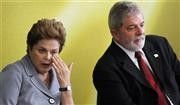Brazil unemployment dips to record low

Brazil’s unemployment rate fell to a record low in November as the country is set to witness the fastest growth in more than two decades.
Unemployment rate in Latin America’s biggest economy fell to 5.7 percent in November from 6.1 percent in October, the Brazilian Institute of Geography and Statistics (IBGE) said on Friday.
Markets had expected the jobless rate to fall slightly to 6 percent in November.
Brazil’s unemployment rate in November was much smaller compared with 7.4 percent in the same month a year earlier and was the lowest since March 2002, IBGE said.
The number of unemployed people in Brazil fell by 20.7 percent to 1.36 million in November compared with November 2009.
Boosted by strong domestic demand, Brazil’s economy is expected to record its fastest growth since 1985.
In the first three quarters of 2010, Brazil's gross domestic product (GDP) expanded by 8.4 percent from the last year.
During January to September 2010, household consumption rose 6.9 percent compared with the same period a year earlier.
Brazil's GDP growth is the second highest in the world, only after China. We have surpassed India, who usually ranks the second, said a Xinhua report quoting Guido Mantega, Brazil's finance minister.
The country’s labor minister Carlos Lupi has said Brazil will create more than 2.5 million jobs this year, and 3 million jobs in 2011.
However, inflation continues to be a concern for the economy as consumer prices rose 0.86 in November, recording the biggest increase in five years.
Annual inflation rate in November stood at 5.63 percent, reaching nearly two-year high. Brazil’s central bank targets to keep the annual inflation at 4.5 percent this year.
The central bank left benchmark rate unchanged at 10.75 percent this month for the third straight month. The bank said it needed more time to weigh the economic impact from monetary measures.
© Copyright IBTimes 2025. All rights reserved.





















